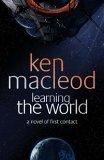
One aspect of science fiction that puts me off occasionally is that you have to suspend too much science. Much of the fiction depends on developments that are, at best, unlikely.
The most common one of those, of course, is faster than light travel. The speed of light, to the best of our current knowledge, is an absolute. Nothing can, and ever will, go faster. That means travel to all but the closest stars will take at least decades and probably centuries, even to the people doing the traveling, let alone the ones left behind. That barrier also makes alien encounters statistically unlikely and probably cumbersome if they do occur. What's the fun of talking to an alien when it takes a couple of centuries to get a reply to a message?
Ken MacLeod's latest, Learning the World, shows it's possible to adhere to the laws of physics and still produce a gripping SciFi novel. In MacLeod's world, humanity has been expanding slowly, at sub-light speed, for 14,000 years. They move from system to system in enormous ships that spin to provide an artificial gravity for the passengers living on the sides and manned by a micro-gravity adapted crew in the center. Journeys take centuries, and are multi-generational. Humans have overcome current age limits and the "founders" of the ship will still be around when it arrives, along with their children, grand children, etc., all educated in the skills they'll need to transform the new system into home. After settling in, a new ship is constructed, a new founder group forms and the process starts over again. In all that time, humans have never encountered any extraterrestrial life more complicate than pond scum.
As the ship at the center of Learning the World approaches a new system, they start picking up radio signals from one of the planets and discover they've got a serious ethical dilemma. The encounter is told from several points of view, including that of a teenaged blogger and an alien astronomer who first spots what he initially believes is a new comet. Both sides are changed in unexpected ways.
I haven't read any of MacLeod's books before, so I'll have to add yet more to my seemingly infinite reading list. What impressed me the most about his writing, aside from getting around the light-speed problem, is that he's made a gripping novel out of relatively little action. Much of the book is politics, which in lesser hands would make for an effective sleeping aid. Instead I was so engrossed that I was frequently in danger of missing my stop on the Tube. I can't ask for much more.
The book is newer than the ones I'm usually picking up, and is available right now only in hardcover, but Amazon has it at a reasonable price. You can buy it here or by clicking on the book cover above.
Tags: Review, SciFi, Books

